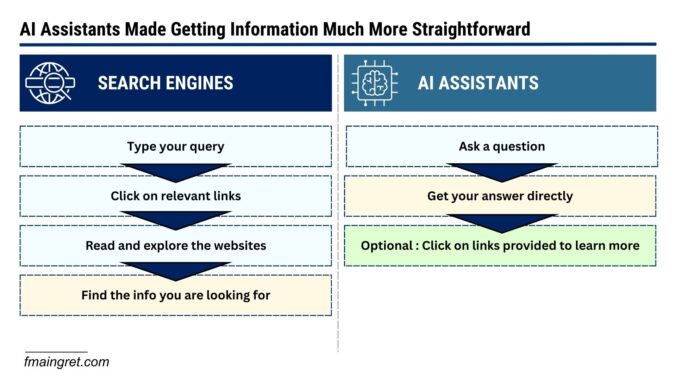I remember that not so long ago, Google was the undisputed king of information online. You needed to know how to fix your sink, figure out how much weight a gorilla can bench press, or buy some new sweatpants? Chances are, “Googling it” was your go-to first step.
Fast forward to 2025, and our behavior has completely changed. You might search TikTok or YouTube if you want to learn how to fix something. For shopping, many customers now start directly on Amazon rather than Google. And of course, we now have AI assistants like ChatGPT and Gemini, which offer compelling new ways to find the right products or services for us.
According to a recent study, 50 percent of fashion executives see product discovery as the key use case for generative AI in 2025, and 82 percent of customers want AI to help reduce the time they spend researching what to buy. With that in mind, it’s easy to understand that being cited by AI assistants will be crucial for businesses in the coming years—just like SEO was essential in past decades.
How Do AI Assistants Differ from Search Engines?
An example is worth a thousand words. Let’s say I’m looking for a new watch. Ten years ago, I would have searched on Google: “best automatic watches with a leather band, a white dial, under $500.”
In 2025, I now have the option to ask ChatGPT the same question. Both the results and the process look slightly different.
As you can see, it’s not perfect (ChatGPT showed me a watch with a steel bracelet). But the major difference is that the AI assistant quickly explained the specifics of each watch and why it was recommended. I can dig deeper and ask more specific questions—like I would if I were speaking with a salesperson at a retail store.
If I had to summarize the difference between the two approaches, I’d say that unlike traditional search engines, AI assistants give you the answer you need before you even have to dive into the links. This makes things much more convenient for users: you get your answer right away, but still have the option to review sources if you want to learn more. And you always have the option to do your own research if you question the answer provided by AI.
What Should Businesses Do?
First of all, don’t immediately fire your SEO guy. In my opinion, SEO isn’t going anywhere (yet). But only focusing on search engines would mean leaving money on the table, as AI assistants are rapidly growing in popularity. As a brand, you want your product to be featured directly in the answers AI provides, and you also want your website or content cited as a source for those answers.
So how do you optimize for AI, and what are the best GEO (Generative Engine Optimization) practices?
Let’s keep in mind that this field is evolving very quickly, with new processes and methods emerging every day. But to optimize for AI, it’s important to understand how it differs from traditional SEO. Optimizing for traditional search engines focuses on ranking websites in search results to drive traffic. On the other hand, optimizing for AI (GEO) is about making your key information understandable and trustworthy so that AI uses it directly in its responses, making your brand a source of knowledge.
The first step here isn’t to identify specific keywords, but to define some ideas you want your product to be associated with. For example, if you sell supplements for bodybuilders, you may want your products to be associated with concepts like building muscle, diet for bodybuilders, or increasing muscle mass.
The next step isn’t just getting backlinks like in traditional SEO, but ensuring that content around these ideas is linked to your brand. This could include your website, news articles, social media posts, blogs, or content on industry partners’ websites. The diversity of sources matters, and ideally, you want new content to be published regularly, as AI tends to favor more recent information. Just like with SEO, being featured by top-tier sources is always better—you’d rather have your product cited in The New York Times than on a random blog no one has heard of. I recommend researching the concept of E-E-A-T (Experience, Expertise, Authoritativeness, Trustworthiness) to learn more.
Now, the content itself also matters—it should be comprehensive and ideally unique. You can’t just duplicate what you find elsewhere. The content should answer specific questions such as “What is the most effective supplement to build muscle?” or “How much creatine should I take per day?” This is where structured data becomes even more important than with SEO, using formats like FAQ schema or HowTo schema.
Finally, just like with SEO, you need to monitor your progress to see how your content performs and make updates over time. And remember: the goal here isn’t to drive traffic to your website, but to have your content become a trusted source of knowledge.
The Future of AI Assistants for Online Shopping
So where is this all going? It’s clear that online shopping is undergoing a major transformation, with AI assistants being used more frequently.
We can imagine a near future where AI doesn’t just suggest products—it shops on your behalf. It might accurately compare offers across retailers, negotiate prices, and even manage subscriptions. I expect personalization to become much more targeted, with AI considering far more factors than it does today. These assistants won’t just help with product discovery; they’ll guide customers through the entire journey, from discovery to post-purchase, including reorders, returns, or how to use the product.
For businesses, I can imagine a world where brands compete for AI assistants’ attention. And just as companies now invest in paid search ads to gain visibility, we may see a system where brands pay AI assistants to be featured in their recommendations or prioritized in responses. This raises ethical questions and could become a major challenge for marketers, but based on current advertising trends, it seems inevitable.
Conclusion
In conclusion, the trajectory is clear: AI assistants are quickly becoming part of the online shopping experience. Just as businesses had to adapt to the dominance of Google in the past, they will need to adapt to AI in the near future.

